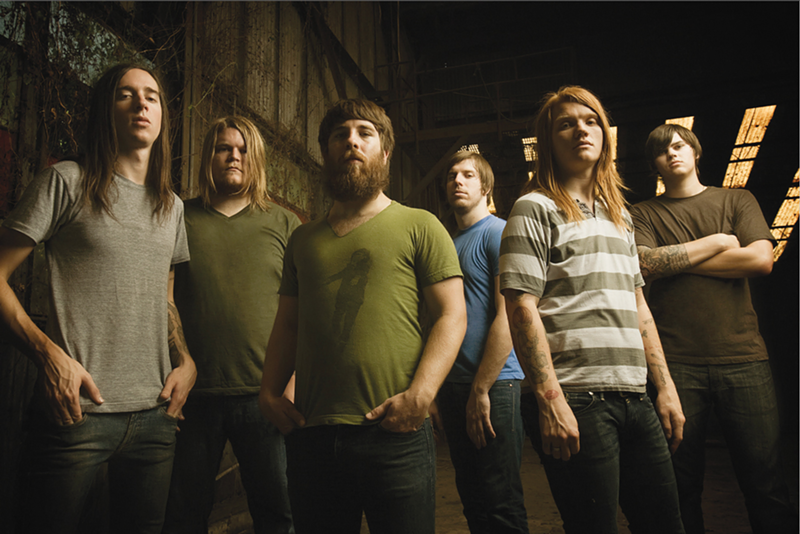S
ince rising from the Metal hotbed of Tampa, Fla., in 1997, Underoath has undergone many structural and philosophical changes. The original quintet’s musical direction encompassed Metalcore as well as Death and Black Metal and, perhaps most importantly, they identified Underoath as a “Christian Metal” band.
Since then, Underoath has rotated membership regularly, to the extent that half of the band considers themselves non-Christians. Even before that shift, lead vocalist Spencer Chamberlain was stating in interviews that Underoath was a secular Metal band with Christian members rather than a Christian Metal band.
“When you’ve been a ‘Christian band’ for so long, it doesn’t come up and it’s who and what you are, but people grow and change and you don’t ever really address it,” says Grant Brandell, Underoath bassist since 2002. “When Daniel joined, he wasn’t on par with the Christian term, so we reevaluated where we were at and realized we’re split down the middle, and not in a bad way. Half the band refers to themselves as Christian, and half doesn’t. It’s kind of hypocritical to say you’re a Christian band if half the band isn’t on par with everything that goes with that. We’re just playing music we love and trying to keep things positive.”
Underoath’s latest album, Disambiguation, slated for release in early November, is another interesting stylistic shift for the Metal sextet. Decidedly darker and even more frenetic, Disambiguation is amazingly melodic and groovily atmospheric. It also represents Underoath’s first album without founding member Aaron Gillespie, who had drummed and provided non-screaming vocals for the band since its inception. Gillespie announced his decision at the end of Underoath’s 2010 spring tour, which could have seriously impacted Disambiguation, as the band planned to begin writing at the tour’s conclusion.
“He was beginning to break away, as far as interests and personality and the direction of the band,” Brandell says. “He had started a side band called The Almost, which was doing well. Looking back on it now, it makes sense, but it was one of those things you think is never going to happen.”
In order to adhere to its schedule, the band recruited former Norma Jean drummer Daniel Davison on an interim basis, but his chemistry with the rest of the band (Brandell, Chamberlain, lead guitarist Timothy McTague keyboardist Christopher Dudley, guitarist James Smith) earned his official installation as Underoath’s new beat-keeper.
“After about a week of practicing we were like, ‘We can keep the schedule like it is,’ ” Brandell says of Davison. “He’s a lot more structured, he has a different feel and it impacts the writing process as a whole. Honestly, it probably works better for me. Aaron was a great drummer but he was a little flashier and all over the place, and Daniel has that structure and I just blend better with him.”
Underoath has always been musically restless, exhibiting substantial diversity within their Metal context, from the early Black/Death Metal leanings to the Hardcore/Classic Rock vibe and Electronic detailing of The Changing of Times. More drastic changes came with the departure of original vocalist Dallas Taylor and Chamberlain’s arrival; the band shifted from Metal to Screamo on They’re Only Chasing Safety, and then drifted into heavier territory, mixing Metalcore with Emo/Punk and Ambient atmospherics on Define the Great Line and blending Industrial components on Lost in the Sound of Separation. With Disambiguation, Underoath continues in the general direction of the last two albums, with a darker overall tone mixed with a Metal groove.
“I think we’re making a conscious effort to progress musically, and that’s in every record,” Brandell says. “When you grow up, your influences and what you like changes a bunch. We’re getting older and we enjoy well-written heavy songs and not so much (just) riffs. I think that was a big part of the new record. Older Rock stuff like Nine Inch Nails, Alice in Chains and Deftones, that’s what we were listening to a lot when we were writing the record, and you definitely get hints of that.”
The definition of disambiguation is the removal of ambiguity to achieve clarity, and that might well stand as the underlying theme to Underoath’s dark and heavy new work.
“The original idea (for a title) was the actual symbol, which is Ø, but there’s quite a few definitions for the symbol and disambiguation is one of them, so we went with that,” Brandell says. “We’ve had a lot of members and we kept going and progressing, so we’re clarifying that it’s not just about one person. Underoath is about musical progression and it always will be.”
UNDEROATH performs Thursday at Covington’s Radiodown with The Chariot and This Is Hell. Buy tickets, check out performance times and get venue details here.


